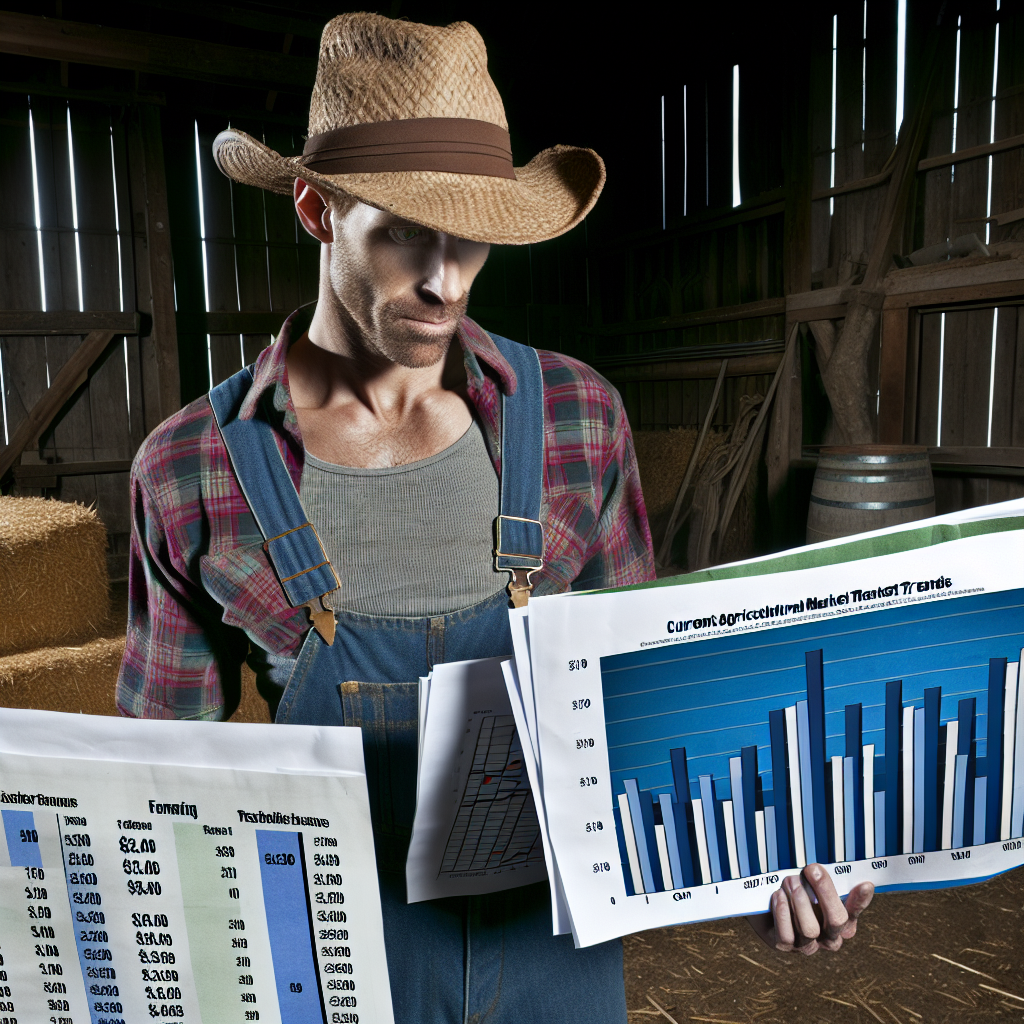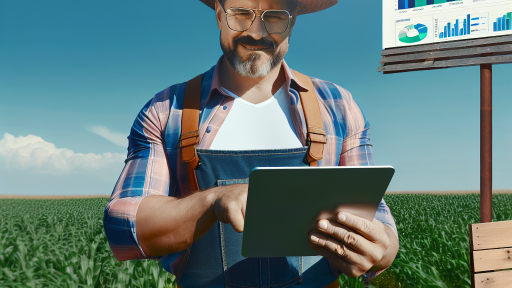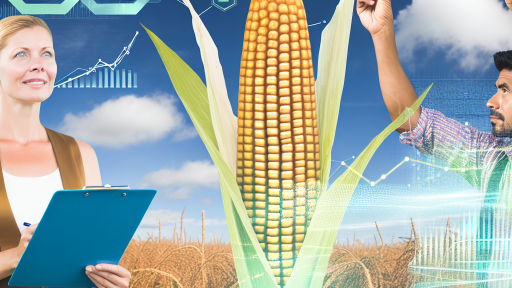Overview of Current Farming Market Trends
Consumers increasingly favor organic and locally sourced produce.
This shift affects demand dynamics in the farming market.
Moreover, consumers seek transparency regarding food origins.
As a result, farms must adopt more accountable practices.
Shifts in Consumer Preferences
Modern farming embraces technology to enhance productivity.
Precision agriculture tools optimize resource usage and crop yields.
Additionally, drones and sensors monitor field conditions efficiently.
These innovations transform traditional farming methods.
Technological Advancements
Diversification helps farmers mitigate market risks effectively.
Many farmers explore niche markets, such as specialty crops.
Furthermore, diversifying into agritourism offers additional revenue streams.
This approach reduces dependency on single crop production.
Market Diversification
Farmers face evolving regulations impacting their operations.
Policies on sustainability and safety shape farming practices.
Compliance demands increased attention to environmental impacts.
Transform Your Agribusiness
Unlock your farm's potential with expert advice tailored to your needs. Get actionable steps that drive real results.
Get StartedConsequently, adaptability is essential for market success.
Regulatory Changes
Climate change poses significant challenges to farming stability.
Unpredictable weather patterns affect crop production significantly.
Farmers must implement adaptive strategies to survive.
Moreover, sustainable practices can help mitigate these impacts.
Climate Change Impacts
Factors Influencing Farming Market Trends
Economic Conditions
The state of the economy significantly affects farming markets.
Increased consumer spending boosts demand for agricultural products.
Conversely, economic downturns can lead to reduced consumption.
Additionally, inflation impacts input costs for farmers.
Farmers need to adapt to these changing economic conditions.
Technological Advancements
Technology plays a crucial role in modern farming practices.
Precision agriculture improves productivity and efficiency.
Innovative tools also help in reducing resource wastage.
Furthermore, automation can lower labor costs over time.
Farmers who embrace technology may gain a competitive advantage.
Climate Change
Climate change is reshaping agricultural practices worldwide.
Unpredictable weather patterns affect crop yields and quality.
Farmers must consider alternative crops and farming methods.
Additionally, climate-smart practices help in sustainability.
Adapting to these changes is essential for long-term viability.
Government Policies
Government regulations significantly influence farming markets.
Subsidies can provide financial relief to struggling farmers.
Trade policies also affect market access for agricultural products.
Furthermore, environmental regulations can impact farming methods.
Showcase Your Farming Business
Publish your professional farming services profile on our blog for a one-time fee of $200 and reach a dedicated audience of farmers and agribusiness owners.
Publish Your ProfileStaying informed about policy changes is vital for farmers.
Consumer Preferences
Shifts in consumer preferences shape farming market trends.
There is growing demand for organic and locally sourced products.
Health-conscious consumers are influencing food production choices.
Additionally, transparency in sourcing is becoming increasingly important.
Farmers must adapt their offerings to meet these demands.
Impact of Technology on Farming Practices
Innovative Farming Techniques
Technological advancements are reshaping farming practices today.
Farmers increasingly rely on precision agriculture techniques.
These methods enhance crop yields while minimizing resource use.
Moreover, farmers utilize drones for crop monitoring and management.
This technology provides real-time data on plant health.
As a result, farmers can make informed decisions quickly.
Automation and Machinery
Automation is becoming a vital component of modern farming.
Tractors and harvesters now operate with minimal human intervention.
This efficiency increases productivity across various agricultural sectors.
Additionally, robotics assist in planting and harvesting crops.
Farmers save time and reduce labor costs with these innovations.
Data-Driven Decision Making
Data analytics empowers farmers to make smarter choices.
Through data collection, they gain insights into farming patterns.
This information helps in optimizing input usage and crop management.
Ultimately, it leads to higher profitability and sustainability.
Farmers can predict pest outbreaks and weather conditions effectively.
Sustainable Practices Through Technology
Technology enables farmers to adopt sustainable practices easily.
For example, soil sensors monitor nutrient levels accurately.
Farmers can then apply fertilizers precisely, reducing waste.
This approach minimizes environmental impact while boosting yields.
Furthermore, technology supports water conservation efforts in agriculture.
The Future of Farming
As technology evolves, farming practices will continue to change.
Investments in agricultural technology are growing significantly.
These advancements promise to enhance food security worldwide.
Farmers must adapt to new technologies to remain competitive.
Collaboration between tech companies and farmers will drive innovation.
Learn More: Regional Market Insights for Successful Farming
Sustainability and Its Role in Modern Agriculture
Defining Sustainable Agriculture
Sustainable agriculture focuses on meeting the needs of the present without compromising future generations.
This farming approach integrates environmental health, economic profitability, and social equity.
Moreover, it emphasizes ecological practices and promotes responsible resource management.
Benefits of Sustainable Practices
Sustainable agriculture yields numerous benefits for both farmers and consumers.
It enhances soil health by using organic fertilizers and crop rotation.
This farming method also conserves water through efficient irrigation systems.
Additionally, it reduces dependency on harmful pesticides and synthetic chemicals.
Showcase Your Farming Business
Publish your professional farming services profile on our blog for a one-time fee of $200 and reach a dedicated audience of farmers and agribusiness owners.
Publish Your ProfileThe Economic Impact
Sustainability can significantly affect the agricultural economy.
Farmers often reduce costs by implementing energy-efficient practices.
Moreover, sustainable farming creates new market opportunities for organic produce.
This shift can lead to increased profitability for farmers pursuing these methods.
Technological Innovations
Technological advancements play a vital role in promoting sustainability.
Precision agriculture uses data analytics to optimize resource use.
Furthermore, drone technology aids in monitoring crop health efficiently.
These innovations help farmers make informed decisions to enhance sustainability.
Consumer Demand for Sustainability
Today’s consumers actively seek sustainable food options.
This demand encourages farmers to adopt eco-friendly practices.
Consumers are increasingly willing to pay a premium for organic and locally-sourced products.
This trend further drives the shift towards sustainable agriculture.
Challenges to Sustainable Agriculture
Despite its benefits, sustainable agriculture faces several challenges.
These include climate change, water scarcity, and soil degradation.
Additionally, the transition requires investment in new technologies and training.
Farmers must navigate these obstacles to achieve sustainable outcomes.
Learn More: Market Forecasts: Planning Your Farm’s Future
Global Supply Chain Challenges in Farming
Rising Input Costs
Farmers face increasing costs for essential inputs.
Fertilizers and pesticides have seen significant price hikes.
Fuel prices also contribute to the financial strain on producers.
These rising costs directly impact farm profitability.
Labor Shortages
Labor availability affects the entire agricultural sector.
Many farming regions struggle to find skilled workers.
Seasonal labor shortages can delay harvests and reduce yields.
Increased immigration regulations further complicate workforce issues.
Supply Chain Disruptions
Global events can severely disrupt supply chains.
Natural disasters, such as hurricanes, can hinder logistics.
Pandemics also expose vulnerabilities in the supply chain.
These disruptions affect timely delivery of seeds and equipment.
Market Access Challenges
Farmers face difficulties accessing local and global markets.
Trade policies can limit export opportunities for agricultural products.
Tariffs may increase costs for importing necessary goods.
Furthermore, geopolitical tensions can complicate trade routes.
Sustainability Pressures
Consumer demand increasingly drives the need for sustainable practices.
Farmers must adapt to environmental regulations focusing on conservation.
This transition often requires significant investment in new technologies.
In doing so, they must balance sustainability with profitability.
Explore Further: Adapting to Market Shifts in Modern Farming

Consumer Preferences and Their Effects on Crop Selection
Shifting Consumer Tastes
Consumer preferences are rapidly evolving within the agricultural market.
Health consciousness drives many consumers to seek organic and non-GMO produce.
Showcase Your Farming Business
Publish your professional farming services profile on our blog for a one-time fee of $200 and reach a dedicated audience of farmers and agribusiness owners.
Publish Your ProfileFurthermore, a growing interest in local sourcing influences purchasing decisions.
Many consumers appreciate the transparency of where their food comes from.
Consequently, farmers are increasingly focusing on regional crops that meet these demands.
Impact on Crop Variety
The shift in consumer tastes significantly impacts the types of crops produced.
Farmers now prioritize crops that align with current market demands.
For example, kale and quinoa have gained popularity due to their perceived health benefits.
Additionally, specialty crops such as heirloom tomatoes are becoming more common.
This trend reflects a broader desire for unique flavors and diverse culinary experiences.
Response to Environmental Concerns
Environmental factors also shape consumer preferences significantly.
Many consumers are concerned about the environmental impact of farming practices.
This concern leads to a preference for sustainably produced foods.
As a result, farmers are adopting practices that are eco-friendly and sustainable.
Organic farming methods are becoming increasingly prevalent due to these preferences.
Influence of Technology and Innovation
Advancements in technology also play a vital role in crop selection.
Farmers utilize data analytics to understand market trends better.
This technology helps in predicting consumer behavior and preferences.
Consequently, farmers can plan their crop selection strategically.
Innovation in breeding techniques allows for the development of crops that meet specific demands.
Market Trends and Economic Factors
Economic conditions directly influence consumer preferences and crop selection.
During times of economic growth, consumers tend to experiment with new foods.
Conversely, in economic downturns, they often revert to familiar staples.
Farmers closely monitor these trends to adapt their offerings accordingly.
Understanding market trends is critical for maintaining profitability in farming.
Delve into the Subject: Emerging Markets in the Agricultural Sector
Government Policies and Support for Farmers
Overview of Government Support
Government support plays a crucial role in the agriculture sector.
It helps farmers manage operational risks effectively.
Policies aim to stabilize income and support productivity.
Types of Government Policies
Numerous policies exist to aid farmers in various aspects.
Subsidies provide financial assistance for crops and livestock.
Insurance programs help mitigate the impact of market fluctuations.
Furthermore, grants support research and technological advancements.
Regional Variations in Support
Support policies vary significantly across regions.
For instance, California emphasizes sustainable practices.
On the other hand, Midwest states focus on corn and soybean production.
This divergence reflects local agricultural needs and challenges.
Impact of Trade Policies
Trade policies also influence farming strategies.
Tariffs can affect the competitiveness of U.S. agriculture.
In addition, trade agreements open new markets for farmers.
These policies can enhance income and promote growth.
Future Trends in Government Support
The future of government support is evolving rapidly.
Showcase Your Farming Business
Publish your professional farming services profile on our blog for a one-time fee of $200 and reach a dedicated audience of farmers and agribusiness owners.
Publish Your ProfileIncreased focus on climate change affects agricultural practices.
This shift will likely lead to more funding for sustainable initiatives.
Moreover, technological advancements will receive greater attention.
Importance of Staying Informed on Policies
Government policies significantly impact the farming industry.
They provide essential support amid growing challenges.
Farmers must stay informed about these policies to thrive.
Future Projections for the Farming Market
Technological Advancements
Technology will significantly shape the farming market in the coming years.
We expect precision agriculture to become mainstream.
Drones will monitor crop health and yield data efficiently.
Furthermore, automation will streamline planting and harvesting processes.
Innovations in biotechnology will enhance crop resilience against diseases.
Shifts in Consumer Preferences
Consumer demand will increasingly favor organic and local products.
As a result, farmers will need to adapt their practices accordingly.
Online grocery shopping will continue to rise.
This trend will push farmers to develop stronger direct-to-consumer channels.
Moreover, sustainability will become a critical influence on purchasing decisions.
Climate Change Impacts
Climate change will pose challenges for farming practices globally.
Farmers will need to adopt more resilient cropping systems.
This adaptation will include diversifying crop varieties.
Additionally, soil conservation will be necessary to sustain productivity.
Water scarcity will drive innovations in irrigation efficiency.
Global Market Dynamics
International trade policies will impact the farming market significantly.
Farmers will navigate fluctuating tariffs and trade agreements.
Emerging markets will present new opportunities for exports.
Conversely, geopolitical tensions may disrupt supply chains.
Hence, adaptability will become crucial for success in the global market.




